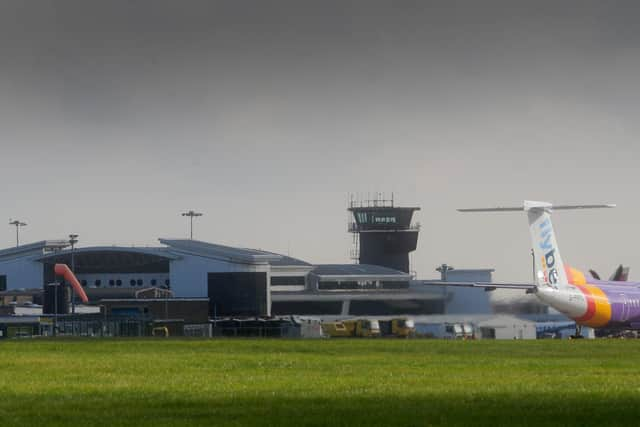Leeds Bradford Airport terminal emissions are 'grains of sand' compared to flight impact says climate commission chairman
and live on Freeview channel 276
That is the message today from Leeds Climate Commission as it responds to apiece by airport chairman Andy Clarke in which he urges the wider community to get behind its proposals for a new terminal building.
In an evidence-based position paper published last month, the commission warned aviation emissions pose a "major challenge" if Leeds is to achieve its net-zero carbon target by 2030.


Advertisement
Hide AdAdvertisement
Hide AdIt followed the publication of recommendations from the Leeds Climate Change Citizens’ Jury which included stopping any airport expansion as well as bringing in measures to discourage flying.
Since then, Leeds Bradford Airport (LBA) has abandoned plans to extend its existing terminal in favour of building an entirely new terminal that it says will be far more energy efficient.
Commission chairman Professor Andy Gouldson said: “Of course we’re in favour of all new buildings being zero carbon. But in this case we should be clear that emissions from the terminal, or from travel to and from the airport, are grains of sand compared with the emissions from flights in and out of the airport.
“There are some ways that we might be able to reduce aviation emissions that we look into in our position paper on aviation. But an energy-efficient airport that depends on more and more flights will take Leeds further away from its carbon neutral target – a target that many people and businesses are working hard to achieve.
Advertisement
Hide AdAdvertisement
Hide Ad"From a climate perspective, a better terminal with the same or fewer flights would be an improvement on the existing situation, but a better terminal that depends on more flights wouldn’t."
Leeds North West MP Alex Sobel, whose constituency includes the airport, had previously said he would not support the expansion of Leeds Bradford Airport.
His view was that the airport should seek to maintain passenger levels but these should not be increased.
Commenting on the updated proposals, he said: "I welcome the measures the airport have taken to reduce their carbon output and the steps they are taking for for the terminal are very positive.
Advertisement
Hide AdAdvertisement
Hide Ad"Whilst I welcome the steps to incentivise fuel efficient aircraft, the target must be to keep carbon emissions from aircraft at or below what they are at now.”
LBA bosses have said the airport aims to expand from four million to seven million passengers a year by 2030.
The commission's position paper looked at the growing emissions from flights taken by Leeds residents - and all flights from Leeds Bradford Airport (LBA) - in the context of a carbon roadmap for the city.
It calculated the city's overall emissions would increase by 21 per cent if emissions from flights taken by Leeds residents from any airport were added to those from fuel and electricity used in the city.
Advertisement
Hide AdAdvertisement
Hide AdAnd if the city became responsible for all LBA flight emissions and passenger numbers expanded as projected, emissions from all flights to and from the airport would be equal to Leeds’ total emissions from its consumption of all fuels and electricity by 2026.
Prof Gouldson said: “Leeds has taken an important step in showing the impact of aviation emissions on the city’s carbon budget. This hasn’t been done for any other UK city, and it’s not currently included in national carbon accounting either. It needs to be.
“It’s not straightforward to calculate but whichever way you do it, the paper shows that emissions from flying present a major challenge.
“Even if we work very hard to do everything else to respond to the climate emergency and to reach net zero emissions by 2030, we won’t achieve the overall emissions reductions needed without tackling flying."
Advertisement
Hide AdAdvertisement
Hide AdThe paper calls for a national aviation strategy to support the coordinated delivery of measures first to limit and then to offset the impacts of aviation emissions.
It also explores the possible impact of a raft of measures from taxes to tree-planting which might in theory reduce or offset emissions from flights to or from Leeds Bradford Airport.
